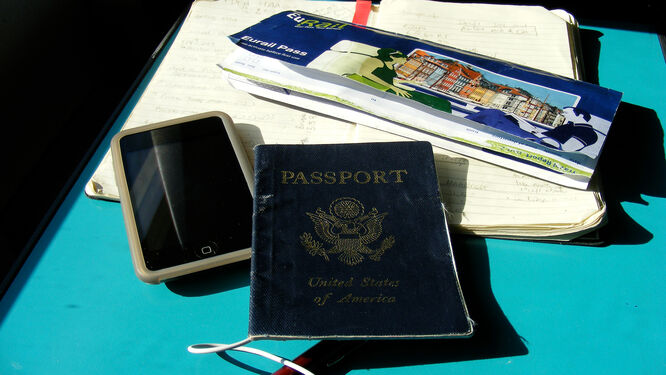Losing It All...and Bouncing Back
By Rick Steves
You're winging your way across Europe, having the time of your life, when you make a simple mistake. You set your bag down next to your café chair, and before you know it…your bag is gone. Unfortunately, today's the day you tucked your passport, credit cards, and extra cash in your bag instead of in your money belt. That sinking feeling is the realization that you've lost everything but the euros in your pocket.
Odds are, this won't ever happen to you. But a little bit of advance preparation can make even this worst-case scenario a minor bump in your European adventure.
What to Do If You Lose It All
Don't panic. First of all, take a breath. Panic clouds your judgment. And don't beat yourself up: No matter how careful, any traveler can get ripped off or lose a bag. I once met a family in Amsterdam who managed to lose all their bags between the airport and their first hotel but went on to have a very successful trip. A positive attitude is a great asset.
Ask for help. If you're in a country where little English is spoken, enlist the help of a local English speaker to assist you in making phone calls or explaining the situation to officials. Try your hotelier or someone at the tourist office: Even in the smallest towns, someone is likely to know at least a little English. Fellow travelers you've met and even family or friends back home can also be sources of help.
For emergency help (for any reason — police, medical, and fire), dial 112 from any phone. This toll-free number is the European Union's version of 911. In most cases, operators are able to answer in English. In the United Kingdom, dial 999 in an emergency.
File a police report. Find a police officer and report the theft or loss. Having a police report may help with replacing your passport and credit cards, and it's a must if you file an insurance claim for a lost rail pass or expensive travel gear. The police may be able to direct you to a local travelers' aid office or Red Cross-like organization. And if you're lucky, someone may actually turn in your bag. That happened to me one time. My stolen bag showed up at the police station — turned in by a Good Samaritan who found it discarded after the thief rifled through its contents. Thieves don't want your clothes or your bag. They want only what they can resell, and they discard the rest.
Gather critical information. In the best situation, you've got easy-to-access copies of important documents (either photocopies or electronic backups). If you don't have your bank or embassy's contact information, look it up. Your hotelier or a tourist-office staffer should be able to help you place necessary collect or toll-free calls. Retrieve information you've stored online or solicit help from folks back home. Be careful about emailing passport and credit-card numbers.
Replace your passport. This is your top priority. Without a passport, you can't leave the country, and you may have problems checking into a hotel or proving your identity. First, it's smart to report that your passport has been lost or stolen at travel.state.gov. To get a replacement, you'll need to go in person to the closest embassy or consulate (in the capital and sometimes major cities, too).
Every US consulate operates a US Citizen Services office, which aids Americans traveling abroad in coping with natural disasters, receiving money, and replacing passports (dial +1 202 501 4444; in the US, call 888 407 4747). You may be able to make an appointment at the embassy or consulate (often via its website), or you may need to show up during open hours and wait. If you can, save time by getting new passport photos and by filling out the required forms at the US State Department website before you go. Having a photo of your passport or other official ID can help; if you don't, embassy staff can look up your previous passport records, interview you and your travel partners, and even call contacts at home to verify your identity.
A replacement passport costs $130, plus a $35 acceptance fee. If you don't have the funds, the embassy will help you contact someone at home who can wire money directly to the embassy. If no one can wire money, the embassy may waive the fee or give you a "repatriation loan" — just enough funds to cover the new passport and get you back home. Embassies are typically able to issue replacement passports within a few days — though note that you won't be able to get a replacement passport on weekends or holidays except in the case of a life-or-death emergency.
If you're Canadian, you'll need to report the loss or theft to the local police, as well as the nearest embassy or consulate. Canadian authorities will conduct an investigation into the circumstances, which may delay the processing of your request. You must complete an application form and a statutory declaration concerning the lost/stolen passport, supply two passport photos and documentary proof of Canadian citizenship, and pay the fees.

Cancel debit and credit cards. Within two days, cancel your lost or stolen debit and credit cards (meeting this deadline limits your liability to $50) and order replacements. Most banks have mobile apps where you can report a loss; Visa, Mastercard, and American Express all have global customer-assistance centers, reachable by collect call from anywhere. You'll need to verify your identity (with some combination of your birthdate, your mother's maiden name, your Social Security number, or answers to security questions you've set up — memorize these, don't carry a copy), and you may be asked for the name of the bank that issued the card, card type (classic, platinum, or whatever), card number, primary and secondary cardholders' names, cardholder's name exactly as printed on the card, billing address, home phone number, and circumstances of the loss or theft. If you are the secondary cardholder, you'll also need to provide the primary cardholder's identification-verification details.
Your bank can generally deliver a new card to you in Europe within two to three business days. Some may even be able to wire cash to keep you going or pay for your hotel room directly. Ask about these extra services.
If necessary, arrange for a wire transfer. A friend or relative can transfer money to you via Western Union's website or app (or they can call 800 225 5227). A "control number" is assigned to the transfer. If you have your passport, simply present it with the control number to a Western Union agent, who gives you cash. (Western Union has thousands of agents at banks, travel agencies, post offices, train stations, airports, currency-exchange offices, and supermarkets in Europe.) There's a hefty fee and a poor exchange rate, but the cash can be ready for pickup in a matter of minutes. If you don't have your passport, Western Union lets your financial angel set up a "secret question" that only you can answer to confirm your identity. Or you can use a slow US State Department service that wires money to an embassy or consulate for pickup during business hours.
It's possible to transfer money from a bank in the US to a bank in Europe, but this may take several days (you'll probably have new cards faster). If your situation is dire and you can't get anyone to transfer or wire you money, ask the consulate about a "repatriation loan." Usually this is enough money to cover a night's lodging and a plane ticket home. Your passport will be stamped "Valid for Return to US Only" until your loan is repaid. If this happens to you, don't even think about stiffing Uncle Sam — after six months, the State Department forwards the paperwork to the Treasury Department and the IRS.
Rearrange travel plans. Depending on how long it takes to get your passport replaced — and how far you have to travel to reach an embassy or consulate — you'll probably need to rearrange your travel plans. Cancel and reschedule hotels and flights as soon as possible to avoid losing deposits or paying change fees (explaining the situation may help). If you're stuck without cash or credit cards for a few days, see if your bank or a family member back home can pay for your hotel stay. If you have travel insurance, it may cover some costs; ask.
Replace travel gear. Once you've started the process of replacing your passport and credit and debit cards, you can think about replacing travel gear such as your phone, camera, or tablet. Depending on your insurance policy, you may be able to get reimbursed for part of the replacement cost. Decide which items are critical enough to your trip to replace immediately.
If you need to have something sent from home, have it addressed to you at the hotel you'll be staying at when it arrives; your hotelier will be happy to hold it for you. To speed things up, try second-day US-Europe services (such as DHL), though figure on four days for delivery to a small town. If you're not staying at a hotel (for instance, if you're camping or caravanning), you can have mail sent to any city's post office, addressed to you in care of "Poste Restante"; for convenience, pick a small town with only one post office and no crowds.
Replace travel documents. Point-to-point rail etickets can often be reprinted from any computer or at the station, but tickets purchased at the station and printed on special ticket paper probably can't be replaced. If you lose a phone that contains an electronic pass, you can replace it by filling out some paperwork (but you may have to pay out of pocket for tickets until the issue is resolved). Paper passes are not replaceable if lost or stolen. There's no need to replace printed copies of airline, hotel, or car-rental reservations — this information is all online. Once you have your new passport, these businesses can easily look up your reservation.
Refill prescriptions. Bring in a copy of your prescription to a pharmacy — if you don't have it, contact your doctor's office. They can usually email or fax a copy to you in Europe. Your optometrist can do the same for prescription eyewear.
Replace your rental-car key. If you lose the key to your rental car, call the car-hire company with your rental agreement number and your exact location. Be prepared for considerable expense and a delay: You will be charged several hundred dollars for a replacement key, and you may need to wait 24 to 48 hours for delivery of new keys or even a different vehicle.
Make the best of the situation. Getting everything straightened out can take a while. Be flexible and patient. It may not help at the time, but try to remember that your loss will make for a good story when you get home. Like a friend of mine says, “When it comes to travel, Tragedy + Time = Comedy.

